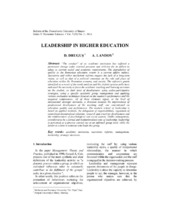Leadership in higher education
Peer reviewed, Journal article
Published version
Permanent lenke
https://hdl.handle.net/1956/9530Utgivelsesdato
2014Metadata
Vis full innførselSamlinger
Sammendrag
“The conduct” of an academic institution has suffered a permanent change under external pressure and criticism for its failure to adapt to current social and economic requirements. The degradation of quality in the Romanian education system is a current affairs subject. Successive and rather incoherent reforms suggest the lack of a long-term vision, as well as that of a political consensus on the role and place of education within the Romanian economy and society. The reference points identified as a result of the needs analysis and the student opinion polls have indicated the necessity to focus the academic teaching and learning activities on the student, on their level of development, using active-participative strategies, using a specific academic group management and applying various evaluation techniques focused on the student’s performance and his acquired competences. All of these elements signal, at the level of institutional strategic decisions, a direction towards the improvement of professional development of the teaching staff, one concentrated on education quality and performance. The modern school of leadership is based on applied methods, the delegation of responsibilities, regulation of centralized-decentralized relations, research and creativity development and the reinforcement of psychological and social aspects. Unlike management, considered to be a formal and institutionalized type of leadership, leadership is perceived as a process carried out at an informal group level, while the leader as a boss is someone who leads this group.
